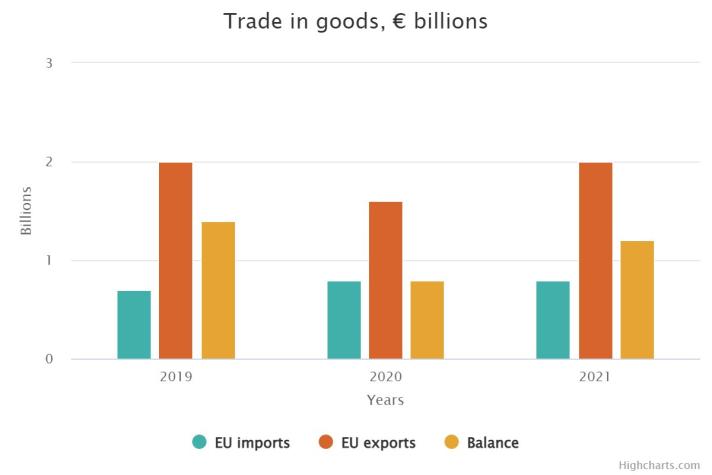Overall relations
Customs relations and cooperation between the EU and Georgia are part of the EU's overall political and economic relations with this country. Georgia is a partner country of the Eastern Partnership, since its foundation in 2009, and of the European Neighbourhood Policy, as well since its initiation in 2004. In 2014, the EU and Georgia agreed on an Association Agenda, delineating the priorities for reform in the country, which was subject to an update in March 2022 to cover the 2021-2027 period. In June 2022, Georgia was awarded European Perspective and with it the potential to be awarded candidate status once certain priorities specified by the Commission have been addressed.
The Association Agreement between the European Union and the European Atomic Energy Community and their Member States with Georgia, signed on 27 June 2014 and entered into force on 1 July 2016, contains a number of economic and trade cooperation rules, including general provisions on:
- Customs and trade facilitation (Chapter 5, art. 66-75)
- Taxation (Chapter 3, art. 280-285)
Trade relations
The EU and Georgia Association Agreement introduces a preferential trade regime, the Deep and Comprehensive Free Trade Area (DCFTA). This regime increases market access between the EU and Georgia based on having better-matched regulations. Georgia has been a member of the World Trade Organisation since 2000.
Customs relations
Georgia joined the World Customs Organisation in 1993 (October 26, 1993).
The EU and Georgia Association Agreement
- Creates a closer economic integration of Georgia with the EU based on reforms in trade-related areas. It is based on the principles of the World Trade Organisation.
- Removes all import duties on goods and provides for broad mutual access to trade in services.
- Allows EU and Georgian companies to set up a subsidiary or a branch office on a non-discriminatory basis (same treatment as domestic companies).
- Allows Georgian trade-related laws to match selected pieces of the EU legal framework (e.g. good governance and rule of law).
- Helps to attract foreign investment to Georgia whilst providing more economic opportunities by expanding the EU market to Georgian goods and services.
The EU and Georgia Customs Sub-Committee (article 74) reports to the Association Committee in Trade configuration, as set out in Article 408 (4) of the Agreement.
Under the authority of the EU-Georgia Customs Sub-Committee, a Working Group composed of representatives from the EU Commission, interested Member States and Georgia sees to the regular and systematic follow-up of the specific objectives and activities. This activity is assigned to the Georgia Strategic Framework, which establishes appropriate work programmes or roadmaps and organises monitoring and evaluation mechanisms.
Rules of Origin
Georgia joined the Pan-Euro-Med Convention on June 1 2018. The EU is in the process of amending 21 origin protocols within the pan-Euro-Mediterranean (PEM) area, by implementing an alternative set of rules of origin applicable alongside with the rules of the PEM Convention, on a bilateral basis pending the adoption of the revised Convention. The new rules became applicable, in an initial stage, between the EU and Georgia on 1 September 2021.
Within the Commission:
- DG TAXUD is in charge of the management of the customs and taxation section of the Agreement
- OLAF deals with anti-fraud issues
Tax relations
The EU and Georgia Association Agreement
- Enhances good governance in the tax area, with a view to the further improvement of economic relations, trade, investment and fair competition.
- Commitment to implementing the principles of good governance in the tax area, i.e. the principles of transparency, exchange of information and fair tax competition, as subscribed to by Member States at EU level.
- Provides for gradual approximation of the indirect tax legislation to the EU, namely the EU legislation of VAT and excise duties.
Background information
The EU is the main trade partner of Georgia and it provides over €100 mio to Georgia annually in technical and financial assistance. Roughly, 21% of its trade takes place with the EU, followed by Turkey (15%) and Russia (11.4%). On the other hand, EU trade with Georgia represents solely 0.1% of its total trade, amounting to approximately €2.8bn in 2021. In terms of exports, EU exports to Georgia amounted in 2021 to €2bn, while in terms of products the key export traded goods are chemical products, mineral products and machinery and appliances. As concerns the imports instead, the EU imported goods from Georgia amounted to the value of €812 million, always in 2021, and the key import traded goods include mineral products, chemical products and vegetables. Under the EU4Digital, the EU and Georgia are conducting pilot projects to increase cross-border e-commerce with the EU by 50%, and with the Erasmus+ programme between Georgia and the EU, over 11,000 students and academic staff exchanges have taken place since 2014. Moreover, Georgia’s citizens started benefitting from visa-free travel to the Schengen area on 28March 2017. Besides, in terms of import duties, Georgia benefitted from the unilateral Generalised Scheme of Preferences (GSP), and until 31 December 2016, also from a special incentive rewarding sustainable development and good governance (GSP+), putting into place a transition period, which allows the business to adjust the new preferential trade regime provided by the DCFTA. On 1 January 2017, the country graduated from the program, hence stopping receiving the GSP benefits.
Source: DG Trade, Date of retrieval: 04/11/2022

